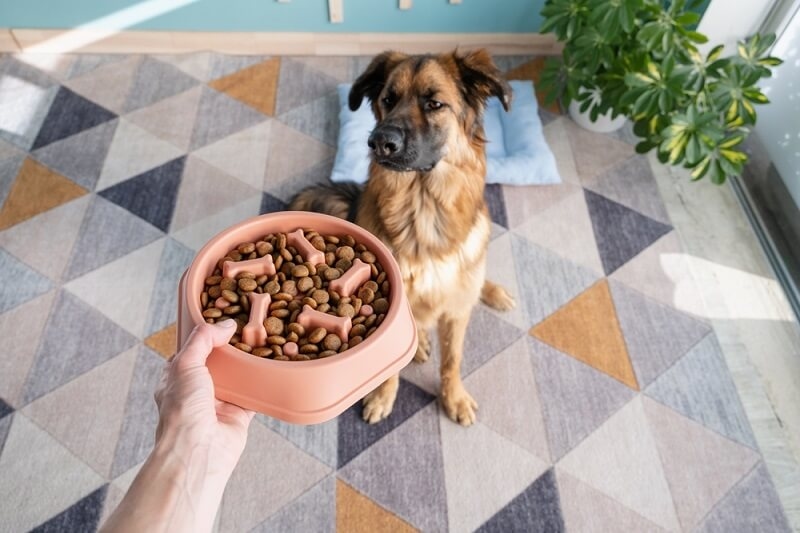
The digestive system is essential to a dog's general well-being. Like humans, dogs can get indigestion, be intolerant to food, and have other digestive issues. Although in some cases the problem might go away without any aid, severe symptoms or those that continue over time should not be neglected at all.
Identifying common digestive problems in dogs and comprehending how diet can support them is the very first step in ensuring that your furry friend is safe and healthy.
A dog depends a lot on its stomach to digest the food it eats and get the necessary nutrients it needs to be healthy and strong. The signs of the troubles in the digestive tract become obvious. Signs like diarrhea, vomiting, bloating, and constipation give a signal that the underlying causes are improper. Digestive problems in dogs may be of different kinds depending on the factors involved, such as low-quality food, sudden changes in the diet, infections, and even stress.
Since dogs cannot tell us what is wrong with them, the pet owners have to be very vigilant and look out for signs of discomfort. If symptoms become worse, then the best way to proceed is to consult a doctor.
Here are some common digestive issues in dogs:
Being upset with the stomach is the main one among numerous problems, such as diarrhea, where frequency is not a big issue. Diarrhea can be of a sudden nature, triggered by dietary changes, intolerance to food, or infections. Parasites and dirty water are also among the usual culprits. Continuous diarrhea needs help, and the correct treatment for dog diarrhea is needed to prevent dehydration, though in such a case, a single breakout might not be a serious matter.
The instance of vomiting is not that strange, especially if the dog ate too fast or if it ate grass before. Nonetheless, in cases where vomiting becomes frequent or severe, the dog might be suffering from such conditions as intestinal blockage, pancreatitis, or poisoning. It is, therefore, very important to underscore the necessity of observing the practice and taking the dog to the vet when needed.
Constipation is a situation in which the volume of stool has dried up, and it has become very hard to push it out. In a variety of situations, lack of fiber in the food, dehydration, and swallowing of non-food objects can be the reason for it. Constipation over a long period can really be quite painful, and in this case, the dog would need to be given medical attention.
Too much gas or bloating can be the result of swallowing air during a meal or from the poor digestion of some foods. In an intense case, swelling can become the cause of a life-threatening situation known as gastric torsion, particularly in giant dog breeds.
One of the causes of this might be the dogs that have weak stomachs, and hence they are not able to digest proteins, grains, or additives that are in the food. By locating the food that causes the dog to be sensitive and selecting the proper digestive care diet for the dog, you will utilize these two tools to help the dog be comfortable and avoid flare-ups.
Digestive issues do not affect all types of dogs equally. The likelihood of digestion-related problems in different dog breeds is not the same. For example, German Shepherds, Great Danes, Irish Setters, and Miniature Schnauzers are typical representatives of sensitive stomach dog breeds.
In these breeds, minor dietary changes are often accompanied by diarrhea or vomiting. Feeding them with high-grade, easily digestible foods and refraining from frequent changes in their diet can make them more comfortable and better manage their diseases.
The importance of a dog’s diet is one of the most powerful tools to support digestive health. The food that a dog eats directly affects the health of the dog's stomach and intestines. On the list of effective solutions are the following:

Special digestion diets have been shown to reduce inflammation and allow for better absorption of nutrients. A common digestion care dog diet has the necessary, highly digestible protein and contains prebiotics, probiotics, and the proper amount of fiber. This food will repopulate healthy gut bacteria, all while improving stool quality.
Symptoms such as vomiting or diarrhea should be addressed by giving dogs bland meals for a while, such as boiled chicken and plain rice; this will prepare the dog's stomach for a better recovery. This simple mixture is also non-irritating while providing energy, and helps dogs recover without placing the digestive system back into high work mode.
Dogs should be given enough time to get used to their new food. Abruptly changing the diet can make digestive problems worse. Gradual transitions over 7–10 days not only eliminate stomach upsets but also allow the digestive system to adjust at a comfortable pace.
Fiber is the main ingredient in the regulation of bowel movements. Pumpkin puree, sweet potatoes, and some fiber supplements made especially for pets are sources of fiber that help pets get rid of constipation. Nevertheless, excess fiber may result in flatulence; thus, moderation is important.
Proper water consumption prevents constipation and supports digestion. Dogs should always be allowed clean, fresh water, and this is even more important right after exercise or during very hot weather.
If a dog eats too quickly, it is very likely that the dog is also taking in a lot of air, which is going to lead to gas and bloating. Smaller portions with more frequent feedings or slow-feeding bowls can reduce these problems and make it easier for the digestive system to cope.
Many pet owners resort to natural and gentle treatment of their pets’ digestive problems along with dietary alterations. Natural remedies for dog digestion may entail:
It is definitely recommended to be gentle with these types of treatments and discuss them with the vet before making new changes, especially for dogs with acute or routine conditions.
The occurrence of diarrhea can be stressful not only for your pet but also for you as the owner. Starting with the diagnosis of the root cause should be the first step in dog diarrhea treatment. In light cases, a 12-hour fasting period and then a bland diet usually do miracles. It is recommended to give a lot of water and electrolytes to prevent dehydration.
In case diarrhea lasts for more than 24 hours or is accompanied by blood, mucus or the dog is lethargic, then the problem must be solved by a veterinarian. The vet is going to suggest doing a stool test, prescribing medications or special diets for treatment.
If a dog vomits once or twice over a short period of time, the dog owner should not panic immediately, but if the situation repeats itself, it must not be ignored. A few hours' food withdrawal can be followed by small portions of a bland diet, which is likely to be helpful in mild cases. On the other hand, when vomiting is persistent and the dog is weak and if blood is present in vomit, a vet doctor has to be informed urgently.
The vet can carry out thorough examinations for different diseases and determine whether the cause is diet, an infection, or the result of another illness. Dealing with the problem at an early stage prevents the dog from getting sick with other complications, and it is relieved quickly.
Digestive issues rank among the most frequent health problems of pets, and they can cause the dog to be in a bad mood. Diarrhea, vomiting, or food sensitivities are stomach disorders that should never be treated lightly. The fortunate thing is that most of these problems, if not all, can be controlled or even avoided by taking the right diet and following the doctor's instructions.
Finding right solutions for digestive issues is a big help for the dogs in their mid-to-long life span and quality of life.
This content was created by AI